Open internet and inclusive technology
New digital technology and the internet brought with it a promise of equal access to knowledge, openness and connection. Their ubiquity has brought opportunity for progress. However, access to digital technology is vastly unevenly distributed. Technology, especially when relying on artificial intelligence, location and biometric data, can amplify social, racial and environmental injustices. We work to bring back the original purpose of an open internet and enable inclusive, sustainable technologies that work for all and for the greater good.
Filter resources
-

Commission launches internet fee consultation full of biased questions
The European Commission has launched an “exploratory questionnaire” about telecom corporations wishing to levy an internet fee from online content providers. EDRi’s response outlines why that’s a ludicrous idea, a threat to net neutrality, and bad news for all internet users.
Read more
-
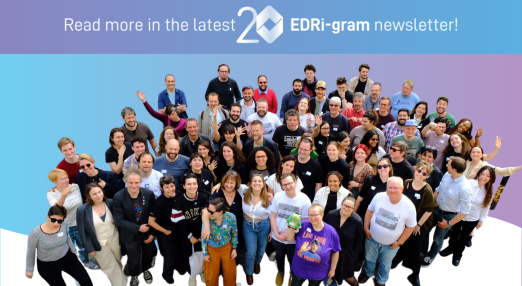
EDRi-gram, 31 May 2023
Here is what happened since we last touched base. The EDRi network met in Belgrade for our General Assembly. We strategised, got updates from national members about the state of #DigitalRights, and enjoyed personal connection time. A BIG welcome to EDRi's newly elected Board members: Andrej Petrovski, Director of Tech at EDRi member SHARE Foundation, and Isabela Fernandes, Executive Director of TOR Project. In the last fortnight, we also celebrated 5 years of the General Data Protection Regulation. The anniversary was marked by the €1.2 billion fine for Meta issued thanks to EDRi member noyb's work. The decision required 10 years and 3 court procedures against the Irish Data Protection Commission, which shows the need for better GDPR enforcement.
Read more
-
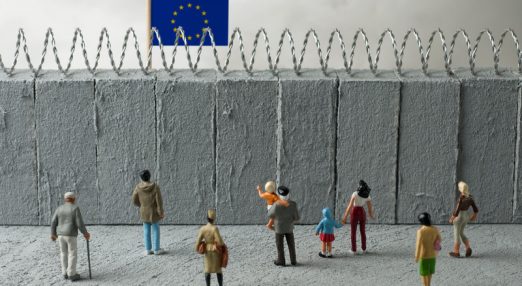
The EU must respect human rights of migrants in the AI Act
Amnesty International Secretary General Agnès Callamard has sent an open letter calling on the Rapporteurs and members of leading committees on the EU Artificial Intelligence Act (AI Act) to prohibit the use of certain artificial intelligence (AI) systems which are incompatible with human rights of migrants, refugees, and asylum seekers in the AI Act.
Read more
-
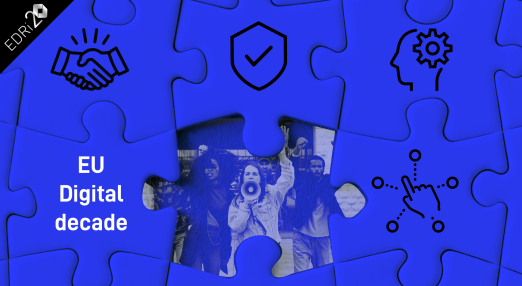
Missing: people’s rights in the EU Digital Decade
In June 2023, the European Union (EU) will adopt its first report on the state of the ‘Digital Decade’ – a plan launched in 2022 with digitalisation targets for business, public services and people’s digital skills. The Digital Decade reads more like a business plan than a policy programme.
Read more
-

EDRi-gram, 17 May 2023
Last week, European Parliament committees voted to protect people’s rights in the AI Act. In a landmark moment, Members of Parliament (MEPs) supported all key civil society demands. We’re still concerned about some gaps and loopholes but it’s a big win for our network and partners’ work! The PEGA committee also adopted its final report and recommendations. It included many valuable proposals but failed to go all the way in calling for an EU-wide ban on spyware. You can also read our take on what’s missing from the EU Digital Decade report (spoiler alert: our rights).
Read more
-

EDRi-gram, 3 May 2023
This week, as the EU Parliament gets ready to vote on the AI Act, we are urging members of Parliament to protect people’s rights in this landmark legislation. We are putting forward our recommendations to lawmakers on protecting journalists from all kinds of surveillance through the European Media Freedom Act. Among other digital rights updates, read about how Irish and French Parliamentarians have become the latest voices to sound the alarm against monitoring of people’s messages in the proposed Child Sexual Abuse Regulation. You can still share your feedback on the draft programme for an initial decolonising process for the digital rights field in Europe.
Read more
-

Position Paper: The Cyber Resilience Act, how to make Europe more digitally resilient?
If the EU’s new Cyber Resilience Act truly wants to improve the EU’s digital security landscape, it must do more than introduce an industry certification scheme: true IT security requires long-term software support, transparent and safe vulnerability handling and disclosure, and an acknowledgment of the essential role of free and open software communities in Europe’s digitisation.
Read more
-

EDRi-gram, 19 April 2023
In this edition of the EDRi-gram, we are inviting you to share your feedback on a draft programme for an initial decolonising process for the digital rights field in Europe. Multiple voices are raised against the EU CSAR proposal amidst plans revealing the wish to systematise government access to data. We are also looking at why it's important to uphold patients’ rights in a new health data law. And what are the consequences of the recently adopted Law on Olympic Games in France, which formalises the introduction of algorithmic video-surveillance.
Read more
-
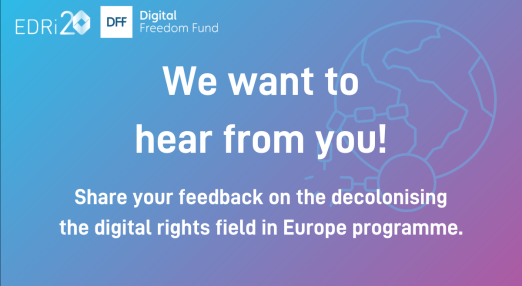
Decolonising the digital rights field in Europe: Call for feedback on our first draft programme
EDRi and the Digital Freedom Fund (DFF) are looking for your input on a draft programme for an initial decolonising process for the digital rights field in Europe. We want to hear from you!
Read more
-
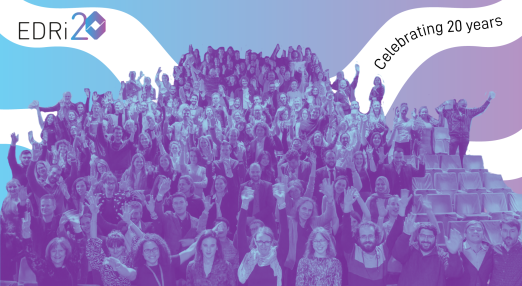
A collective project: EDRi celebrates turning 20 in the capital of the EU
On 21 March, we celebrated EDRi 20th anniversary in Brussels, the heart of the European Union. Close friends and supporters gathered at Bozar, the Center for Fine Arts, for a fun and dynamic evening celebrating the networks's collective work for far, current efforts and a hopeful future.
Read more
-

Decolonising Digital Rights: a process imbued with love
This blog reflects on the end of the design phase of the decolonising digital rights in Europe process. It discusses our learnings and the next steps of the process as we begin to build and disseminate the programme.
Read more
-
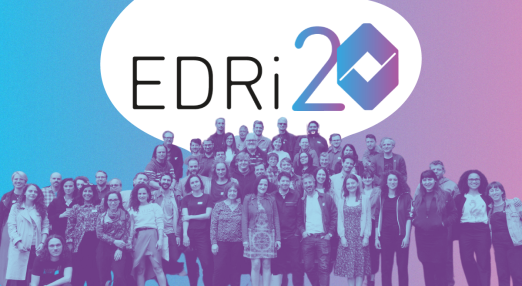
Shaping the next 20 years of digital rights in Europe
Last week we celebrated the 20th anniversary of EDRi, the European Digital Rights network, and its two decades of defending and promoting rights online and off. The digital rights movement has come a long way and we are at a crucial moment to shape our shared digital future for the better. The EU’s fundamental rights framework has been pivotal in our achievements so far, but it has never served everyone equally. How can we better equip Europe for the human rights challenges of the digital age?
Read more
